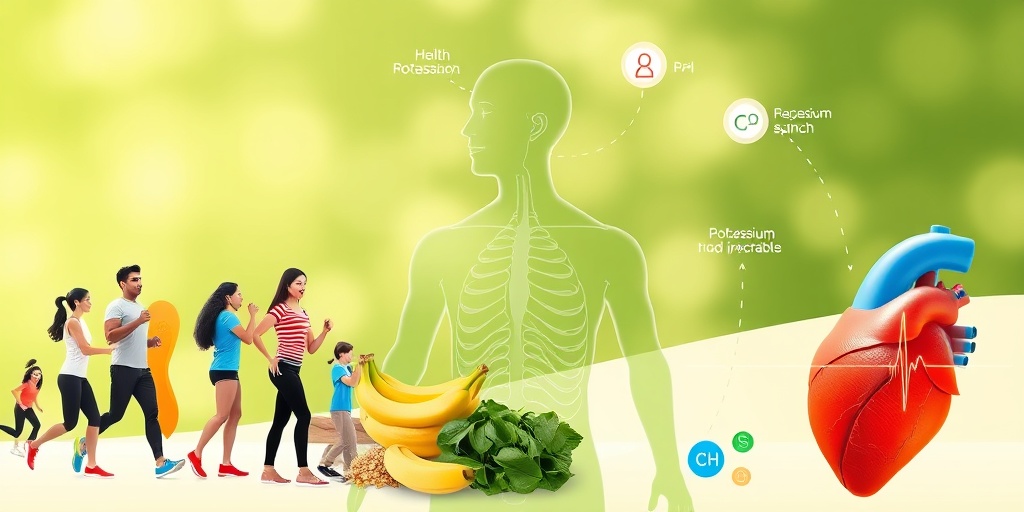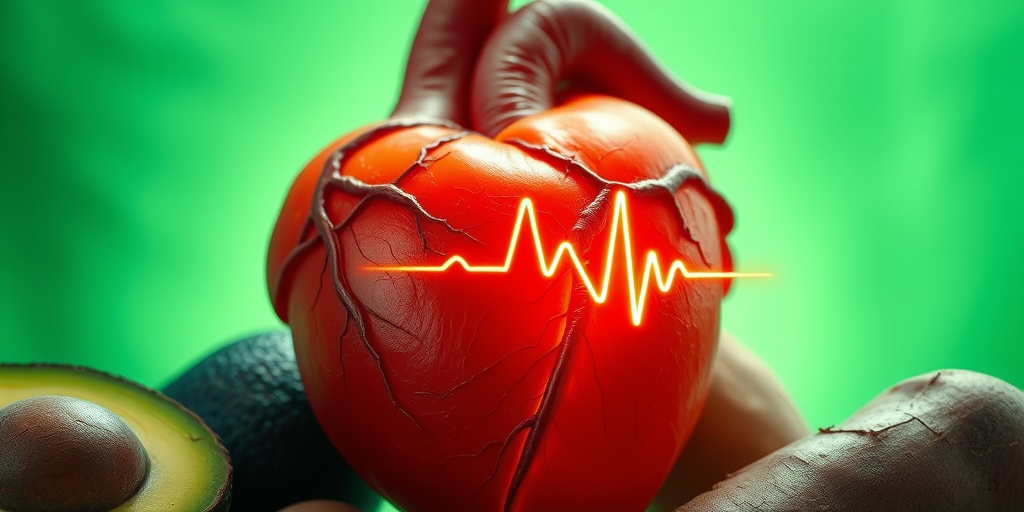What Is Potassium?
Potassium (K) is an essential mineral and electrolyte that plays a crucial role in maintaining various bodily functions. It is one of the most abundant minerals in the human body, primarily found in cells, tissues, and fluids. Potassium is vital for several physiological processes, including muscle contractions, nerve function, and fluid balance. The chemical symbol for potassium is K, derived from the Latin word “kalium.” This mineral is not only important for our health but also plays a significant role in various biochemical reactions.
Potassium is primarily obtained through our diet, with rich sources including fruits, vegetables, legumes, and dairy products. Foods like bananas, oranges, potatoes, spinach, and avocados are particularly high in potassium. The recommended daily intake of potassium varies by age and gender, but for most adults, it is around 2,500 to 3,000 mg per day. Ensuring adequate potassium intake is essential for overall health and well-being.
Potassium Functions in the Body
Potassium serves multiple functions in the body, making it a vital nutrient for maintaining health. Here are some of the key roles potassium plays:
1. Regulating Fluid Balance
Potassium helps maintain the body’s fluid balance by working in conjunction with sodium. It regulates the amount of water in and around cells, ensuring that they function properly. This balance is crucial for maintaining blood pressure and overall cardiovascular health. A diet rich in potassium can help counteract the effects of sodium, potentially lowering the risk of hypertension.
2. Supporting Muscle Function
Muscle contractions rely heavily on potassium. This mineral is essential for transmitting electrical signals between nerve cells and muscles, allowing for proper muscle function. A deficiency in potassium can lead to muscle weakness, cramps, and spasms. Athletes, in particular, should pay attention to their potassium intake to support optimal performance and recovery.
3. Promoting Nerve Function
Potassium is crucial for the proper functioning of the nervous system. It helps transmit nerve impulses, allowing communication between the brain and the rest of the body. This function is vital for reflexes, coordination, and overall cognitive function. Low potassium levels can lead to neurological issues, including confusion and irritability.
4. Maintaining Heart Health
Potassium plays a significant role in maintaining a healthy heart. It helps regulate heart rhythm and can prevent arrhythmias (irregular heartbeats). Adequate potassium levels are associated with a lower risk of stroke and heart disease. Including potassium-rich foods in your diet can contribute to cardiovascular health and overall well-being.
5. Supporting Bone Health
Emerging research suggests that potassium may also play a role in bone health. It helps neutralize metabolic acids that can lead to bone loss. A diet rich in potassium may help maintain bone density and reduce the risk of osteoporosis, especially in older adults.
6. Aiding in Nutrient Absorption
Potassium is involved in the absorption of various nutrients, including carbohydrates and proteins. It helps transport these nutrients into cells, ensuring that the body receives the energy and building blocks it needs for growth and repair.
Conclusion
In summary, potassium (K) is a vital mineral that supports numerous functions in the body, from regulating fluid balance to promoting heart health. Ensuring you consume enough potassium through a balanced diet rich in fruits, vegetables, and other potassium-rich foods is essential for maintaining optimal health. If you’re concerned about your potassium levels or have questions about your dietary intake, consider consulting a healthcare professional or visiting Yesil Health AI at yesilhealth.com for evidence-based health answers. Remember, a healthy lifestyle starts with informed choices! 🍌🥑

Potassium Sources in Food
Potassium (K) is an essential mineral that plays a crucial role in maintaining various bodily functions, including nerve transmission, muscle contraction, and fluid balance. Ensuring you get enough potassium through your diet is vital for overall health. Let’s explore some of the best food sources rich in potassium.
Fruits High in Potassium
Fruits are not only delicious but also packed with nutrients, including potassium. Here are some fruits that can help you boost your potassium intake:
- Bananas: Often hailed as the poster child for potassium, a medium banana contains about 422 mg of potassium. 🍌
- Oranges: A medium orange provides approximately 237 mg of potassium, along with a healthy dose of vitamin C.
- Avocados: This creamy fruit is not only rich in healthy fats but also contains around 975 mg of potassium per avocado. 🥑
- Melons: Cantaloupe and honeydew are both excellent sources, with a cup of cantaloupe offering about 427 mg of potassium.
Vegetables Packed with Potassium
Vegetables are another fantastic source of potassium. Incorporating a variety of these into your meals can help you meet your daily requirements:
- Spinach: This leafy green is a potassium powerhouse, with one cup of cooked spinach providing around 839 mg of potassium. 🥬
- Sweet Potatoes: A medium sweet potato contains about 541 mg of potassium, making it a nutritious and filling option.
- Potatoes: A medium baked potato with skin can provide approximately 926 mg of potassium.
- Tomatoes: Fresh tomatoes and tomato products, like sauce and paste, are also rich in potassium.
Legumes and Nuts
Legumes and nuts are not only great sources of protein but also contain significant amounts of potassium:
- Beans: Kidney beans, black beans, and white beans are all excellent sources, with one cup of cooked beans providing around 600-800 mg of potassium.
- Lentils: A cup of cooked lentils contains about 731 mg of potassium.
- Nuts: Almonds and pistachios are particularly high in potassium, with a one-ounce serving of pistachios containing about 291 mg.
Dairy Products
Dairy products can also contribute to your potassium intake:
- Yogurt: A cup of plain yogurt can provide around 573 mg of potassium.
- Milk: One cup of milk contains approximately 366 mg of potassium.
Incorporating these potassium-rich foods into your diet can help you maintain optimal health and prevent deficiencies. Remember, the recommended daily intake of potassium for adults is about 2,500 to 3,000 mg, depending on age and sex. 🌟
Potassium Deficiency Symptoms
Potassium deficiency, also known as hypokalemia, can lead to a variety of health issues. Understanding the symptoms is crucial for early detection and treatment. Here are some common signs of potassium deficiency:
Muscle Weakness and Cramps
One of the most noticeable symptoms of low potassium levels is muscle weakness. You may experience:
- Cramps: Sudden and painful muscle cramps, especially in the legs, can occur.
- Weakness: Generalized weakness or fatigue may make daily activities feel more challenging.
Digestive Issues
Potassium plays a vital role in muscle contractions, including those in the digestive tract. A deficiency can lead to:
- Constipation: Difficulty in bowel movements may arise due to weakened intestinal muscles.
- Bloating: You might experience bloating or discomfort in the abdomen.
Heart Palpitations
Low potassium levels can affect your heart’s rhythm, leading to:
- Irregular Heartbeat: You may notice a fluttering sensation in your chest or irregular heartbeats.
- Increased Blood Pressure: Potassium helps regulate blood pressure, and a deficiency can lead to hypertension.
Fatigue and Mood Changes
Feeling unusually tired or experiencing mood swings can also be linked to potassium deficiency:
- Fatigue: Low energy levels and persistent tiredness may be a sign of inadequate potassium.
- Mood Swings: Some individuals may experience irritability or mood changes.
If you suspect you have a potassium deficiency, it’s essential to consult a healthcare professional for proper diagnosis and treatment. Maintaining a balanced diet rich in potassium can help prevent these symptoms and support overall health. 🌈

Potassium Excess Symptoms
Potassium (K) is an essential mineral that plays a crucial role in various bodily functions, including muscle contractions, nerve signaling, and maintaining fluid balance. However, just like any nutrient, too much potassium can lead to health issues. This condition is known as hyperkalemia, and it can have serious implications for your health. Let’s explore the symptoms of potassium excess and what you should be aware of.
Understanding Hyperkalemia
Hyperkalemia occurs when there is an abnormally high level of potassium in the blood. This can happen due to several factors, including kidney dysfunction, excessive potassium intake from supplements, or certain medications. The normal range for potassium in the blood is typically between 3.5 and 5.0 mEq/L. Levels above this can lead to symptoms that may require immediate medical attention.
Common Symptoms of Potassium Excess
Recognizing the symptoms of potassium excess is vital for early intervention. Here are some common signs to watch out for:
- Muscle Weakness: One of the first signs of hyperkalemia is muscle weakness or fatigue. This can affect your ability to perform daily activities.
- Heart Palpitations: High potassium levels can disrupt the electrical signals in your heart, leading to irregular heartbeats or palpitations.
- Nausea and Vomiting: Gastrointestinal symptoms such as nausea, vomiting, or abdominal cramping can occur as your body reacts to elevated potassium levels.
- Numbness or Tingling: Some individuals may experience numbness or tingling sensations, particularly in the extremities.
- Shortness of Breath: In severe cases, hyperkalemia can lead to respiratory issues, making it difficult to breathe.
If you experience any of these symptoms, especially if you have underlying health conditions or are on medications that affect potassium levels, it’s essential to seek medical advice promptly. 🩺
Potassium and Heart Health
Potassium is often referred to as a heart-friendly mineral, and for good reason. It plays a significant role in maintaining cardiovascular health. Let’s delve into how potassium impacts heart function and why it’s essential for overall well-being.
The Role of Potassium in Heart Function
Potassium helps regulate heart rhythm and is crucial for the proper functioning of the heart muscle. It works in tandem with sodium to maintain a healthy balance of fluids in the body, which is vital for optimal heart performance. Here are some key ways potassium contributes to heart health:
- Regulating Blood Pressure: Adequate potassium intake can help lower blood pressure levels by balancing out the negative effects of sodium. This is particularly important for individuals with hypertension.
- Preventing Arrhythmias: Potassium is essential for maintaining a regular heartbeat. Low levels can lead to arrhythmias, which can be life-threatening.
- Supporting Muscle Function: The heart is a muscle, and like any other muscle in the body, it requires potassium to function effectively. Proper potassium levels ensure that the heart contracts and relaxes efficiently.
Sources of Potassium
To support heart health, it’s important to include potassium-rich foods in your diet. Some excellent sources of potassium include:
- Bananas 🍌
- Oranges and orange juice 🍊
- Potatoes (especially with skin) 🥔
- Spinach and other leafy greens 🥬
- Beans and legumes
- Avocados 🥑
Incorporating these foods into your meals can help you maintain healthy potassium levels, which is essential for heart health.
In conclusion, while potassium is vital for various bodily functions, it’s important to monitor your intake to avoid excess. Understanding the symptoms of potassium excess and its role in heart health can empower you to make informed dietary choices. Remember, a balanced diet is key to maintaining optimal health! 🌟

Potassium for Muscle Function
Potassium (K) is an essential mineral that plays a crucial role in various bodily functions, particularly in muscle function. It is one of the key electrolytes that help maintain fluid balance, nerve function, and muscle contractions. Understanding how potassium contributes to muscle health can help you optimize your physical performance and overall well-being.
How Potassium Affects Muscle Contraction
Muscle contraction is a complex process that relies heavily on the presence of potassium. When a nerve sends a signal to a muscle, potassium ions move in and out of muscle cells, facilitating contraction and relaxation. This process is vital for all types of muscle, including:
- Skeletal Muscle: Responsible for voluntary movements.
- Cardiac Muscle: Essential for heart function.
- Smooth Muscle: Found in organs and blood vessels.
A deficiency in potassium can lead to muscle weakness, cramps, and even spasms. This is why athletes and active individuals must ensure they consume adequate amounts of potassium to support their performance and recovery. 🏋️♂️
Signs of Potassium Deficiency
Recognizing the signs of potassium deficiency is crucial for maintaining muscle health. Some common symptoms include:
- Muscle Cramps: Sudden, painful contractions of muscles.
- Weakness: A general feeling of fatigue or lack of strength.
- Heart Palpitations: Irregular heartbeats that can be alarming.
If you experience any of these symptoms, it may be time to evaluate your potassium intake. Foods rich in potassium include bananas, oranges, potatoes, spinach, and avocados. 🍌🥑
Potassium and Exercise Performance
For athletes and fitness enthusiasts, potassium is particularly important. It helps regulate fluid balance, which is essential during exercise. Proper hydration and electrolyte balance can enhance endurance and reduce the risk of cramps. Studies have shown that adequate potassium levels can improve performance in endurance sports, making it a vital nutrient for anyone looking to optimize their workouts. 🏃♀️
Potassium Recommendations and Guidelines
Understanding the recommended daily intake of potassium is essential for maintaining optimal health. The guidelines can vary based on age, sex, and level of physical activity. Here’s a breakdown of the general recommendations:
Daily Potassium Intake Recommendations
- Adults: The recommended daily intake for adults is about 2,500 to 3,000 mg.
- Children: Varies by age, generally ranging from 1,000 to 2,300 mg.
- Athletes: May require higher amounts, especially during intense training or competition.
It’s important to note that these values can differ based on individual health conditions and dietary needs. Always consult with a healthcare provider for personalized recommendations. 🩺
Sources of Potassium
Incorporating potassium-rich foods into your diet is the best way to meet your daily requirements. Here are some excellent sources:
- Fruits: Bananas, oranges, and cantaloupes.
- Vegetables: Spinach, potatoes, and sweet potatoes.
- Legumes: Beans and lentils.
- Nuts and Seeds: Almonds and sunflower seeds.
Including a variety of these foods in your diet can help ensure you’re getting enough potassium to support muscle function and overall health. 🌽🥔
Monitoring Potassium Levels
For those concerned about their potassium levels, a blood test can provide valuable insights. A potassium (K) in blood test measures the amount of potassium in your bloodstream, helping to identify any deficiencies or excesses. Maintaining balanced potassium levels is crucial for heart health and muscle function, so regular monitoring can be beneficial, especially for individuals with underlying health conditions. 🩸
In conclusion, potassium is a vital mineral that supports muscle function and overall health. By understanding its importance and ensuring adequate intake through diet, you can enhance your physical performance and maintain optimal well-being.

Frequently Asked Questions about Potassium (K)
What is Potassium (K)?
Potassium (K) is an essential mineral and electrolyte that plays a crucial role in various bodily functions, including muscle contractions, nerve signaling, and maintaining fluid balance. It is vital for overall health and well-being.
What are the symptoms of Potassium (K) deficiency?
Deficiency in Potassium (K) can lead to several symptoms, including:
- Muscle weakness or cramps
- Fatigue
- Irregular heartbeat
- Digestive issues
- Numbness or tingling
How is Potassium (K) measured in a blood test?
Potassium (K) levels are typically measured through a blood test, often referred to as a serum potassium test. This test helps determine the concentration of potassium in the blood and can indicate whether levels are too high or too low.
What is the molecular weight of Potassium (K)?
The molecular weight of Potassium (K) is approximately 39.10 g/mol. This value is important for various scientific calculations and understanding its properties.
What are the dietary sources of Potassium (K)?
To maintain healthy levels of Potassium (K), consider incorporating the following foods into your diet:
- Bananas
- Oranges
- Potatoes
- Spinach
- Beans
Can Potassium (K) supplements be beneficial?
In some cases, Potassium (K) supplements may be recommended, especially for individuals with a deficiency or certain medical conditions. However, it is essential to consult a healthcare professional before starting any supplementation.
What is the relationship between Potassium (K) and heart health?
Potassium (K) is vital for heart health as it helps regulate heartbeat and blood pressure. Adequate potassium intake can reduce the risk of cardiovascular diseases.
How can I increase my Potassium (K) intake naturally?
To naturally boost your Potassium (K) intake, focus on consuming a variety of fruits, vegetables, legumes, and whole grains. Staying hydrated and maintaining a balanced diet will also support healthy potassium levels.
Is there a risk of consuming too much Potassium (K)?
Yes, excessive intake of Potassium (K) can lead to hyperkalemia, a condition characterized by high potassium levels in the blood. This can cause serious health issues, including heart problems. Always consult with a healthcare provider regarding your potassium intake.




